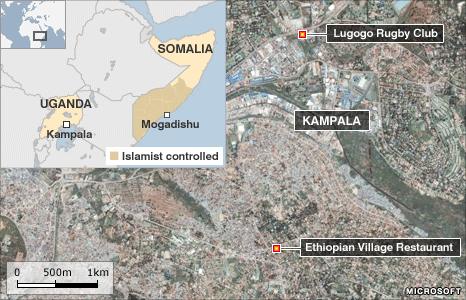'Somali link' as 74 World Cup fans die in Uganda blasts
- Published
The death toll from twin blasts that hit the Ugandan capital as football fans gathered to watch the World Cup final has risen to 74, officials say.
Another 70 were injured in the explosions at a Kampala rugby club and an Ethiopian restaurant.
Police are investigating whether the blasts were suicide bombings, and blamed Somalia's al-Shabab militants.
Ugandan peacekeepers operate in Somalia, and al-Shabab has threatened to hit Kampala in the past.
About 5,000 African Union troops from Uganda and Burundi are based in Mogadishu to protect the fragile interim government.
The African Union Mission in Somalia (Amisom) force is engaged in frequent firefights with Islamist insurgents which control much of southern and central Somalia.
Al-Shabab welcome attack
Both explosions caused death and injury, although many more people died at the crowded rugby club, where fans were watching the game on a large screen.

"These bombs were definitely targeting World Cup crowds," Insp Gen Kale Kayihura said, warning people to stay away from large crowds in the coming days.
The explosions ripped through the venues with about 10 minutes remaining in Sunday night's match. At both scenes chairs lay overturned, with blood and pieces of flesh on the floor.
One unnamed witness told the BBC how he was caught in the rugby club blast.
"I just heard the bomb. In fact, I was blacked out, I didn't know anything. I was just down on the grass, I didn't know anything until when I gained consciousness, then I started now, crawling, coming out."
Many - if not most - of those killed and injured were foreign nationals, with both venues popular destinations for expatriates living in Kampala.
One of the dead was an American, reported to be an aid worker from California. The nationalities of the people killed have not been released.
The crowd at the rugby club was usually a mix of Ugandans and foreigners, the police chief said.
There were reports that a severed head was found at one of the scenes, leading investigators to suggest that the attacks could have been the work of suicide bombers.
Insp Gen Kayihura said he believed Somalia's militant group al-Shabab could be behind Sunday evening's attacks.
In particular, the attack on the Ethiopian Village restaurant raised suspicions of al-Shabab involvement: Addis Ababa backs Somalia's government against the rebels.
Somali militants have been involved in terror attacks across East Africa in the past, but - if proven - this would be the first time the current group has struck outside Somalia.
But the BBC's Will Ross, in the Kenyan capital Nairobi, says there is no proof as yet that al-Shabab was involved. The blasts could be linked to next year's elections in Uganda, our correspondent adds.
In Mogadishu, a militant commander said he was "happy" with the attacks in Uganda.
However, Sheik Yusuf Sheik Issa refused to confirm or deny that al-Shabab was responsible.
He told the Associated Press news agency: "Uganda is one of our enemies. Whatever makes them cry, makes us happy. May Allah's anger be upon those who are against us."
Uganda's President Yoweri Museveni criticised the attackers and said his country would not "run away" from its commitments in Mogadishu.
"People who are watching football are not people who should be targeted. If they [attackers] want a fight, they should go and look for soldiers."
The African Union has said the attacks will not affect its summit, which is due to be held in Kampala later this month.
'Screaming and running'
At least three Americans, members of a Church group from Pennsylvania, were wounded at the Ethiopian restaurant.
One, Kris Sledge, 18, said from his hospital bed: "I remember blacking out, hearing people screaming and running."
Mr Sledge, of Selinsgrove, Pennsylvania, who had a bandaged leg and burns on his face, told AP: "I love the place here, but I'm wondering why this happened and who did this. At this point we're just glad to be alive."
US President Barack Obama said the explosions were "deplorable and cowardly".
Secretary of State Hillary Clinton said the US would work with the Ugandan government "to bring the perpetrators of this crime to justice".
The US embassy in Kampala has confirmed that one American was among the dead.
"The nationalities of all the fatalities will be released later," said police spokeswoman Judith Nabakooba.
- Published12 July 2010
- Published14 June 2010